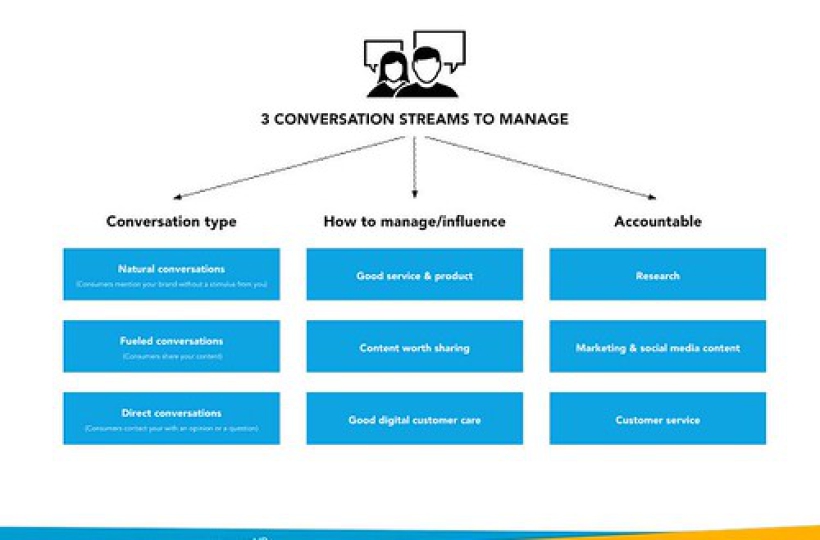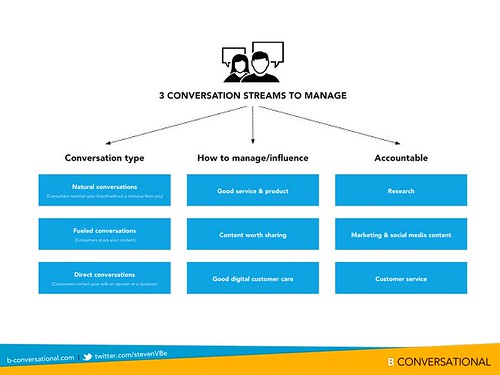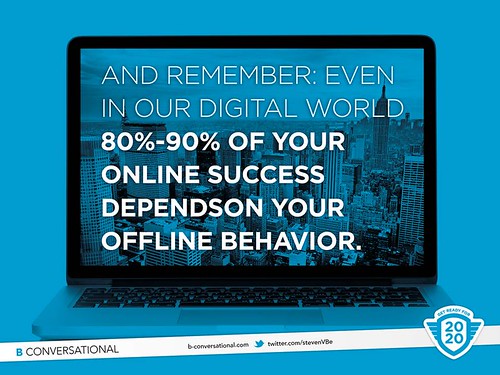Three crucial conversation streams to manage

Every day we find loads of conversations about brands on the internet. Managing them is a core activity for every marketing team in the world. If you take a closer look at these conversations, it becomes clear that there are three different types, and each of them requires its own specific management approach.
- Natural Conversations: these are the spontaneous conversations that consumers have about brands and companies.
- Fueled Conversations: these conversations are about the content a company shares with its audience. The content gives people something to talk about and they are happy to share it.
- Direct Conversations: these conversations contain a question, remark or opinion and are addressed directly to the company.
Three conversation streams, three different management styles
To increase the overall sentiment about your company online, it is important to manage all three types of conversation. A lot of companies are only focusing on tackling the direct conversations through digital consumer care. This is important, but it isn’t enough. All three streams influence the overall reputation of a brand.
Natural conversations are almost always about the product and service quality of a brand. The quality of their offline experience determines the quality of the natural online conversations. In a digital world, we tend to forget that the real experience in the offline world is still the biggest online conversation starter for people.
Fueled conversations are about the commercial content of a brand. As soon as a brand creates fantastic content, people will be happy to share it. The goal is to create a content flow that creates value for the consumer. Instead of launching two big campaigns a year, it is advisable to work with content sparks, since they are shared on a more frequent basis. In order to create impact with these conversations, make sure to use the ‘selling without selling’ techniques from a previous post.
Direct conversations require a reply. Direct conversations are direct questions posed by consumers about products or services. These conversations call for a fast, professional and personal reply.
Three conversation streams, three different parts of the organization involved
Each of the conversations involves a different department.
Natural conversations should be followed by people from the consumer insights team. Natural conversations provide you with loads of information. This is client feedback that you receive without asking any questions. Consumer insights should use the data internally to improve overall product and service quality.
Fueled conversations are the responsibility of the marketing and social media team. The commercial content should always be the responsibility of the marketing team. Online and offline communications need to be aligned. There are still too many companies that don’t inform their online teams about offline communication, and this can give rise to frustrations. Marketing is responsible for all commercial communication and should be involved in content management.
Direct conversations should be handled by customer experience people. The direct online questions are the equivalent of the phone call to the call center or the email with a customer complaint. These questions should be handled by customer care people. Of course, the style and approach online requires a different approach. People responsible for the direct conversations should be trained in general communication skills as well as in specific online skills.
In some larger companies, there are specific conversation hubs that foresee different profiles to handle these three types of conversation. In that case, the conversation hub is a decentralized team of people who work together with marketing, HR, IT, R&D and product management.

